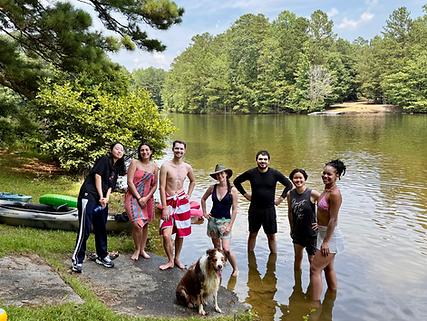OPPORTUNITIES


Prospective Graduate Students

Which student research interests are a good fit for the Kelly Lab?
The Kelly Lab conducts behavioral neuroscience research in non-human animals. Most of our studies involve examining both behavior and the brain. However, while all research projects in the lab have a behavioral component, some projects may not include a neuroscience component. For example, we also conduct studies that examine hormones and behavior. Behavior is at the heart of everything we do, so if your primary interest is behavior, we may be a great fit for you. For our lab, all questions start with behavior.
What kinds of projects do graduate students conduct in the Kelly Lab?
We conduct research using spiny mice and gerbils. Depending on the prior research experience of the graduate student, students may a) begin with a starter project that gets them acquainted with running rodent behavioral assays and learning neural staining techniques (i.e., immunohistochemistry) and neuroanatomy or b) immediately start learning neurosurgeries to probe how the brain modulates X behavior (e.g. how the brain facilitates the preference to affiliate with a group, behave prosocially, etc.). Students simultaneously conduct a non-risky project (i.e., something that will most likely yield a publication in a reasonable amount of time) and a high-risk project (i.e., something highly novel and difficult, such that if it works it may result in a higher-tier publication).
Note: We do not conduct research in humans. We currently do not conduct research on organisms other than spiny mice and gerbils. Projects in the lab must involve some examination of social behavior or social cognition. Unfortunately, we do not have funds at this time to explore other interests. If you're uncertain whether your research interests align with those of the lab, please don't hesitate to reach out to Dr. Kelly to ask!
What makes an applicant competitive?
Qualities that typically lead to successful graduate students:
-
Ability to work independently
-
Self-driven and self-disciplined
-
A passion for conducting science
-
Enjoys nerding out talking, thinking, and reading about behavior
-
Enjoys working with their hands. Conducting research is extremely hands-on and requires long days working with animals, conducting surgeries, and benchwork (i.e., working with tissue or other biological samples).
-
Flexibility. Sometimes research projects simply don’t work out, and that’s okay! Having the ability to adapt and move on is critical to success in science.
-
Understanding that science isn’t perfect and there will be roadblocks and challenges both inside and outside of the lab. We strive to do the best we can, but science, like everything, has its limitations. Learning and growing during these challenges is just as important as conducting the experiments themselves.
Skills that make an applicant even more competitive include:
-
Experience working with rodents, birds, fish, or frogs
-
Experience studying social behavior in non-human animals
-
Experience conducting neurosurgeries
-
Experience conducting hormone assays
-
Background in evolutionary theory
How do I apply to Emory’s Psychology graduate program?
http://psychology.emory.edu/home/graduate/index.html
Please feel free to email me at aubrey.kelly@emory.edu to set up a meeting to discuss research interests and determine if the Kelly Lab and Emory's Psychology Department are a good match for you and your goals. I receive a great deal of emails, so please be patient and considerate. Additionally, I juggle many commitments, so unfortunately I cannot guarantee that I will be able to make the time to meet.
Dr. Aubrey Kelly's Mentoring Philosophy
I am committed to providing high quality and dedicated mentorship to students in the lab. Inherent in this is a commitment to remain flexible and open-minded so that I can provide the best possible style of mentorship for individual students who learn, attend, and are motivated in different ways. The reasons for obtaining a PhD vary – some graduate students wish to pursue careers in academia (research and/or teaching), science communication, research in industry, science policy, consulting, science education and outreach, etc. I strive to do my best to support students and to help them attain their goals. Regardless of student career aspirations, my primary job as a graduate advisor is to help you earn your PhD.
My ultimate goal is to train students to be thoughtful and analytical scientists. Science is a form of communication that creates and evaluates knowledge. I want students in my lab to be able to think critically about information they will be presented with, to know how to find the source of a claim, how to evaluate the empirical research behind the claim, and how to make informed judgments of their own. Understanding and appreciating the scientific method and how it applies to so many aspects of everyday life can improve how an individual navigates the world.
Prospective Undergraduate Researchers
We are not recruiting any
PhD students for Fall 2026
*The Kelly Lab no longer has research positions available for undergraduates for the 2025-2026 academic year*
The Kelly Lab welcomes undergraduate students interested in gaining research experience while at Emory. Preference is given to students with a strong work ethic, ability to commit at least 10 hours per week to research-related activities, and a willingness to make a 4+ semester commitment to the lab. Interested students should contact me by e-mail (aubrey.kelly@emory.edu), provide a short statement of why they want to join the lab, and provide a current resume/CV.



Aubrey M. Kelly

